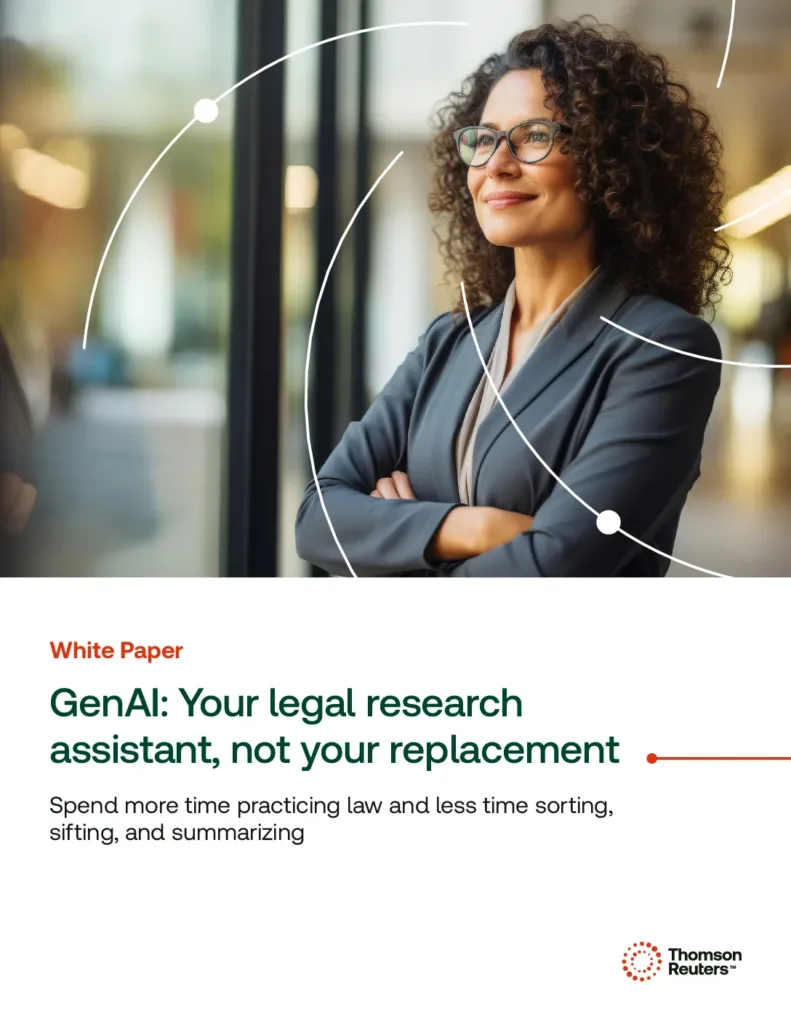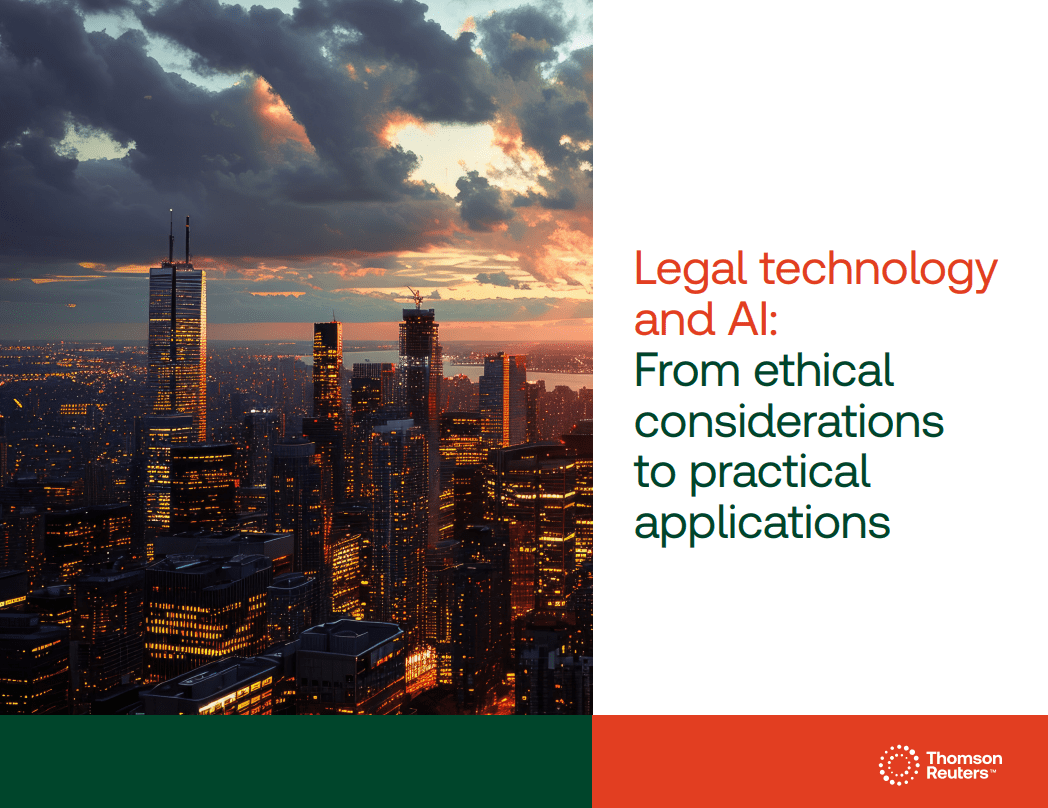2025 report highlighting top current use-cases, benefits and challenges for firms
The legal industry is on the cusp of a technological revolution, driven by the rapid advancement of generative AI (GenAI). As law firms and their corporate clients increasingly adopt these tools, the landscape of legal services is being fundamentally transformed. According to the most recent Generative AI in Professional Services Report, the integration of GenAI is not just a trend but a strategic imperative for firms looking to stay competitive and meet the evolving needs of their clients.
GenAI, with its ability to generate human-like text and insights, is being leveraged across various legal tasks, from document review to legal research and brief drafting. This shift is not only about automating routine tasks but also about enhancing the quality and efficiency of legal work. However, with these advancements come significant challenges that law firms must navigate to ensure the responsible and effective use of GenAI.
Jump to ↓
Top use cases: Document review, legal research, brief drafting
Benefits: Time savings, cost reduction, enhanced efficiency
Challenges: Accuracy, unauthorized practice of law, ethical concerns
Top use cases: Document review, legal research, brief drafting
Document review: The most common application of GenAI identified in the GenAI in Professional Services report in the legal industry is document review. Traditionally, this task has been time-consuming and resource-intensive, often requiring teams of paralegals and junior associates to sift through mountains of documents. GenAI can significantly streamline this process by quickly identifying relevant information, flagging potential issues, and even summarizing key points. This not only saves time but also reduces the risk of human error, ensuring that critical details are not overlooked.
Legal research: Legal research is another area where GenAI is making a significant impact. GenAI tools can rapidly analyze vast amounts of legal literature, case law, and statutes to provide comprehensive and up-to-date insights. This capability is particularly valuable in complex litigation and transactional work, where the ability to quickly access and synthesize relevant information can be a game-changer. Moreover, GenAI can help identify patterns and trends that might not be apparent to human researchers, providing a deeper understanding of legal issues.
Brief drafting: Brief drafting is a critical aspect of legal practice, and GenAI is increasingly being used to assist in this process. GenAI tools can generate initial drafts of legal briefs, memos, and other documents, which can then be refined by human attorneys. This not only speeds up the drafting process but also ensures that the initial document is well-structured and contains all the necessary legal arguments and citations. By automating the initial stages of brief drafting, GenAI allows attorneys to focus on higher-value tasks, such as strategic decision-making and client communication.
Benefits: Time savings, cost reduction, enhanced efficiency
The report found that adoption of GenAI by law firms brought a host of benefits that promise to significantly enhance their operations. One of the most immediate and tangible benefits is time savings. GenAI can perform tasks that would otherwise take hours or even days in a fraction of the time, allowing firms to handle more cases and clients with the same resources. This increased efficiency translates into cost savings, as firms can reduce the need for large teams of support staff and lower overhead costs. Smaller firms also report being able to compete on a more even footing with larger competitors using the leverage provided by GenAI tools.
Moreover, GenAI can enhance the overall efficiency of legal work by providing accurate and consistent results. By automating routine tasks, GenAI frees attorneys to focus on more complex and strategic aspects of their work. This not only improves the quality of legal services but also enhances client satisfaction, as firms can deliver faster and more accurate results.
Challenges: Accuracy, unauthorized practice of law, ethical concerns
While the benefits of GenAI are clear, the report also found significant challenges that law firms must address. One of the primary concerns is accuracy. GenAI tools, while powerful, are not infallible. There is always a risk of errors or misinterpretations, which can have serious consequences in legal contexts. Law firms must implement robust quality control measures to ensure that GenAI-generated content is accurate and reliable, and all legal work product must, as always, be reviewed and signed off by a lawyer.
Another potential issue is the unauthorized practice of law. The use of GenAI to perform tasks that traditionally require a licensed attorney raises ethical and legal concerns. Law firms must be vigilant in ensuring that GenAI is used in a way that does not violate professional standards or regulatory requirements. This may involve developing clear policies and guidelines for the use of GenAI and providing ongoing training to ensure that all team members understand the boundaries. Some firms are also seeing clients coming in the door with documents drafted by consumer-grade GenAI tools, which can be incorrect in obvious or subtle ways.
Ethical concerns also loom large in the GenAI landscape. The potential for misuse, such as the generation of misleading or biased content, must be addressed. Law firms must establish ethical guidelines and oversight mechanisms to ensure that GenAI is used responsibly and transparently. This includes being transparent with clients about the use of GenAI and the steps taken to ensure its accuracy and reliability.

White Paper
Spend more time practicing law and less time sorting, sifting, and summarizing with the power of generative artificial intelligence (GenAI).
Access white paper ↗
Preparing for the future
The integration of generative AI into legal services is not just a technological shift but a strategic imperative for law firms. By embracing GenAI, firms can enhance their efficiency, reduce costs, and deliver higher-quality legal services. However, the responsible and effective use of GenAI requires careful consideration of the challenges and ethical concerns that come with it.
As the legal landscape continues to evolve, law firms must be proactive in preparing for the future. This includes investing in the right technology, developing clear policies and guidelines, and providing ongoing training to ensure that all team members are equipped to navigate the GenAI revolution. By doing so, law firms can not only stay competitive but also lead the way in shaping the future of legal practice.
To learn more about how law firms, their clients, and other professionals are navigating the future of GenAI, read the full report.












